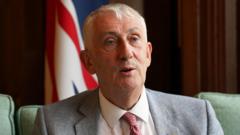Is Espionage Now Allowed in the Commons After China Spying Charges Were Dropped?

Published: 2025-09-20 02:25:18 | Category: technology
The recent decision by the Crown Prosecution Service (CPS) to drop charges against two men accused of espionage for China has raised significant concerns regarding the security of the UK Parliament. Christopher Berry and Christopher Cash were initially charged under the Official Secrets Act for allegedly gathering information detrimental to national safety. The Speaker of the House of Commons, Sir Lindsay Hoyle, expressed his deep dissatisfaction with the CPS’s decision, suggesting it could leave Parliament vulnerable to foreign espionage. In a broader context, this case raises questions about the effectiveness of the UK's measures against potential threats from foreign powers.
Last updated: 07 October 2023 (BST)
Key Takeaways
- The CPS decided to drop charges against Christopher Berry and Christopher Cash due to insufficient evidence.
- Sir Lindsay Hoyle, Speaker of the Commons, expressed concerns over Parliament's security and potential foreign espionage.
- The Home Office has publicly criticised the CPS's decision, calling it disappointing.
- The accused have denied the charges, and Beijing labelled the allegations as "malicious slander."
- There are calls for a private action against the accused to address security concerns.
Background of the Case
The allegations against Christopher Berry and Christopher Cash stem from an investigation that began in March 2023, led by counter-terrorism police. They were accused of collecting information that could potentially serve an enemy state's interests. The charges, filed under the Official Secrets Act, were serious, as they suggested a potential breach of national security.
The Official Secrets Act Explained
The Official Secrets Act is a UK law that protects state secrets and information related to national security. It criminalises the unauthorised disclosure of sensitive information by government employees and others who have access to such information. Violations can lead to severe penalties, including imprisonment. In this case, the CPS determined that the evidential threshold for prosecution had not been met, leading to the withdrawal of the charges.
Reactions from Key Figures
Following the CPS's decision, Sir Lindsay Hoyle did not hold back on his disappointment, stating that he was "a very unhappy speaker." He emphasised that the delay in resolving the case—taking nearly two years overall—was unacceptable. This sentiment was echoed by other political figures, including those within the Home Office.
The Home Office expressed its dismay over the CPS's decision, highlighting the seriousness of the allegations and the potential implications for national security. The Prime Minister's spokesman reinforced this stance, stating that any foreign attempt to infiltrate UK democracy is "unacceptable."
Beijing's Response
In response to the allegations, representatives from the Chinese embassy dismissed the claims as unfounded, labelling them "malicious slander." They urged the UK to cease what they described as anti-China political manipulation. This diplomatic tension underscores the complexities of international relations, especially regarding espionage and national security.
Implications for Parliament and National Security
Sir Lindsay Hoyle's concerns about Parliament's vulnerability to espionage are significant. The decision to drop the charges could embolden foreign actors considering espionage within the UK. It raises questions about the robustness of current security measures in protecting sensitive information and the integrity of democratic institutions.
Potential Security Measures
In light of these events, several measures could be considered to enhance security within Parliament:
- Enhanced Vetting Processes: A thorough review and enhancement of vetting processes for individuals working within Parliament could help mitigate risks.
- Increased Surveillance: Implementing advanced surveillance technologies could deter potential espionage activities.
- Training and Awareness Programs: Regular training sessions for staff on recognising and reporting suspicious activities could strengthen internal security culture.
What Happens Next?
With the CPS's decision, the immediate legal proceedings have ceased, but the broader implications for security and international relations remain. Sir Lindsay Hoyle has indicated that he is considering launching a private action against the two individuals, which may provide a platform to address security concerns without the formal legal framework of a trial.
Moreover, the ongoing dialogue between the UK and China regarding espionage allegations will likely continue to evolve. As geopolitical tensions heighten, the UK may need to reassess its approach to foreign relations and national security.
Public and Political Discourse
The public and political discourse surrounding this case highlights the fine balance between national security and diplomatic relations. It prompts discussions on how to safeguard sensitive information without compromising the openness that is fundamental to a democratic society.
Conclusion
The decision to drop charges against Berry and Cash has undeniably stirred controversy and concern regarding the security of Parliament. As the implications of this case unfold, it is crucial for the UK to reinforce its counter-espionage measures and ensure that the integrity of its democratic institutions is upheld. The ongoing scrutiny from various sectors, including political leaders and the public, will likely shape future policies and actions in response to foreign espionage threats. How the UK navigates this complex landscape will be pivotal in maintaining its sovereignty and security.
FAQs
Why were the charges against Berry and Cash dropped?
The Crown Prosecution Service determined that the evidential threshold for prosecution had not been met, leading to the withdrawal of charges against Christopher Berry and Christopher Cash.
What are the implications of dropping these charges?
The decision raises concerns about the vulnerability of Parliament to foreign espionage and suggests potential gaps in national security that may need addressing.
What is the Official Secrets Act?
The Official Secrets Act is a UK law that protects sensitive state information from being disclosed without authorisation, with severe penalties for violations.
How has Beijing responded to the allegations?
The Chinese embassy has dismissed the allegations as "malicious slander" and urged the UK to stop what they described as anti-China political manipulation.
What actions can Parliament take to enhance security?
Potential actions include enhanced vetting processes, increased surveillance, and training programmes for staff on recognising suspicious activities.



:quality(70)/cloudfront-us-east-1.images.arcpublishing.com/shawmedia/ZK4JNZ2KIREY5DNMIOHKRZ7TUE.jpg)